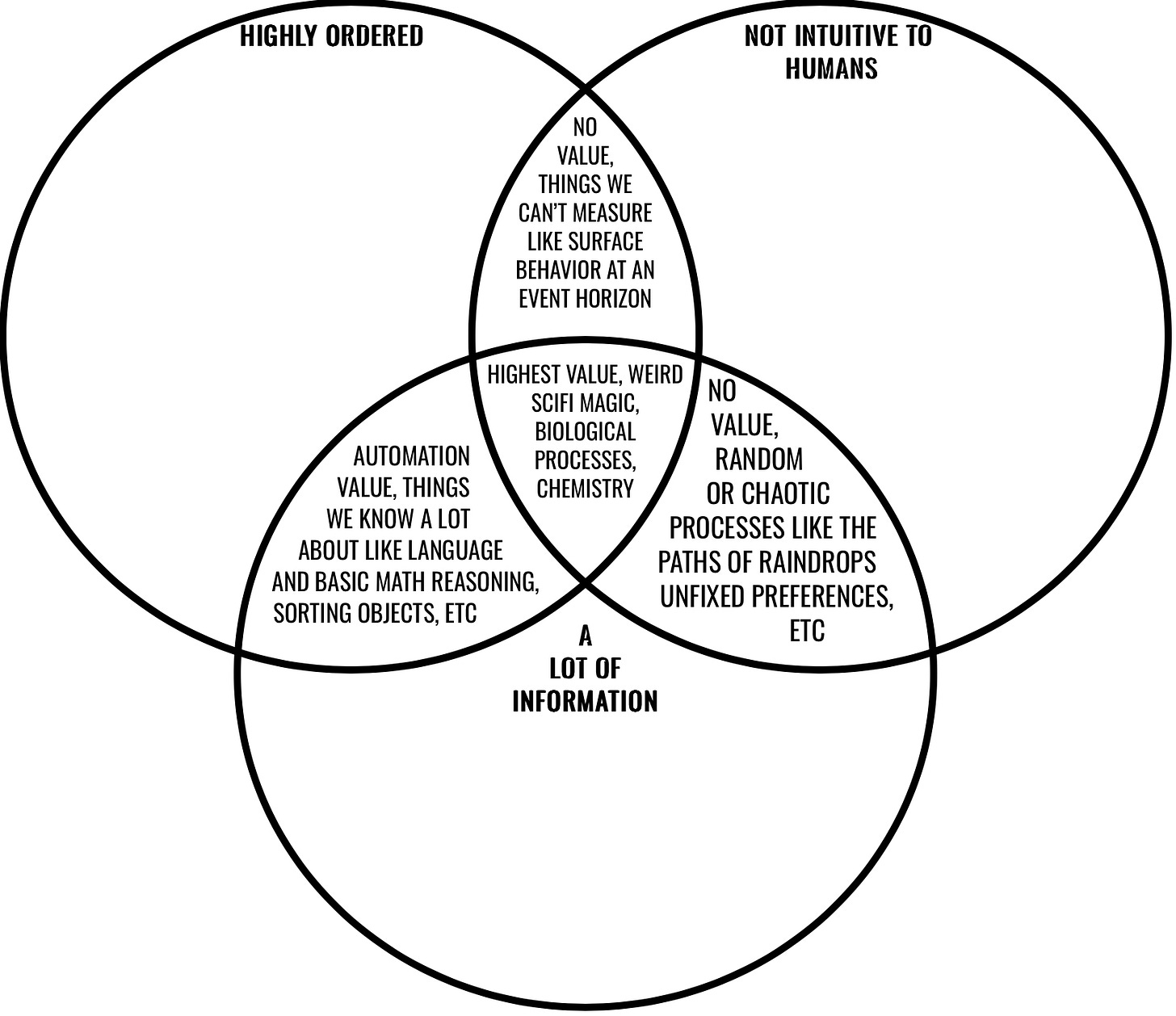How I Think about AI Value
And where I expect there to be huge progress
In my last piece, I wrote about what I think it feels like to be ChatGPT. That may seem like a silly exercise, but it’s what forms the basis of my ideas for where AI can actually be valuable in the future. If I want to intuitively understand if an AI Model can do any particular thing I ask myself the following question:
If I lived somewhere where there was literally nothing else to think about, not even my own body or history, where all the physical laws were basically just information about one particular topic, could I form some kind of strong intuition about that subject if I had trillions of years to think about it?
That might leave humanity as a shared context too far in the rear view mirror for most people to consider it useful but for whatever reason I’ve always been good at emotionally grappling with things like “a trillion years.” Or imagining different weird additions and subtractions to my own mind.
Basically, what I come away with is another set of questions when I imagine myself to be such a being:
How much internal order exists in this one particular dataset? How much signal of some underlying principle is in this data alone such that I don’t need to consider other things? If there’s almost no signal will I have a disproportionately large ability to remember and compare pieces of the dataset?
There’s lots of stuff that isn’t intuitive to me that might be very intuitive to me if I lived differently. If I had an electron microscope stuck over my eyes from the moment of my birth I might have a very good intuition about chemistry. If I was a bat, I could probably imagine what something soft sounds like. If I could smell like a bloodhound, I could probably imagine the smells of certain chemicals just by seeing a diagram. Less extreme examples of this are basically what we do to produce true experts. We send someone away and tell them “Hey, go look at all this stuff most of us don’t have time to look at until you have strong intuitions about it.” More or less a weird way of thinking about what education actually is.
Everything that exists in the day to day realm of humans I would expect to see AI drive value from automation. That’s all the stuff that we are supposed to be good at because we do it all the time and the only question is if a machine can do it more economically. Note, not necessarily better overall, but only more economical. This might not always be desirable, but it’s where I expect the value of things like image generators and LLM’s to produce the biggest splash.
A lot of this will feel amazing but what I want to know where we’ll see things that feel like they came out of Star Wars. To that I ask:
What is Highly Ordered?
Where is there a Lot of Data/Where is a Lot of Data Gettable?
What is Not Intuitive to Humans?
Chemistry is where I feel we might see the most amazing value. What’s more orderly than atoms sharing electrons? And it’s something where we can certainly generate a lot of data. Put in a list of properties of an alloy or compound, put in the chemical components, other process information, then just run training giant training sets until you can start to do things like list out what properties you want a compound to have and get back a chemical formula. No more experimentation. You just search the space of possible compounds.
This is how I think we can get things like room temperature superconductors for those who got super-hyped by LK-99 recently. An awful lot of material science discoveries are made entirely by accident because there’s absolutely nothing intuitive about being able to look at a picture of an atom and then telling someone what you expect it’s specific properties to be.
No shade on chemistry professors, but I learned how to tell relative properties, not absolute properties. I know fluorine is the most electronegative element on the periodic table but I couldn’t look at a fluorine atom and then tell you exactly what that strength is in numerical terms. Especially if you just tacked another atom onto it. Maybe I could say, “Oh, I would expect this to be a gas or a solid at such and such a temperature” but I couldn’t say “I would expect this to have an exact resistivity of blah blah blah.”
Again, imagine you’re just the palm of some weird creature in a perfectly dark world feeling atoms and their properties for trillions of years. Could you do it then? Probably. If your memory was big enough.
The same goes with biology and we’re already most of the way there. You may have heard of alphafold by google which predicts how proteins will fold. It turns out this is another thing where humans can’t think about it very well but it’s a highly ordered process. Think of being able to run these things backwards. Show a machine a disease, give it the genetic code plus some other details, and have it spit back the side-effect free cure. I could see endless applications for this and endless permutations for individual medicine as well.
Of course, there’s also worries on the negative side like someone building something truly evil like a pathogen optimizer but the best way to defend against that is to build an immune maximizer. If you want to know another partial inspiration of the Index and the Forum as I conceptualized them here it was to figure out what data an AI would need in its training set to produce a future that humans would actually want to inhabit.



